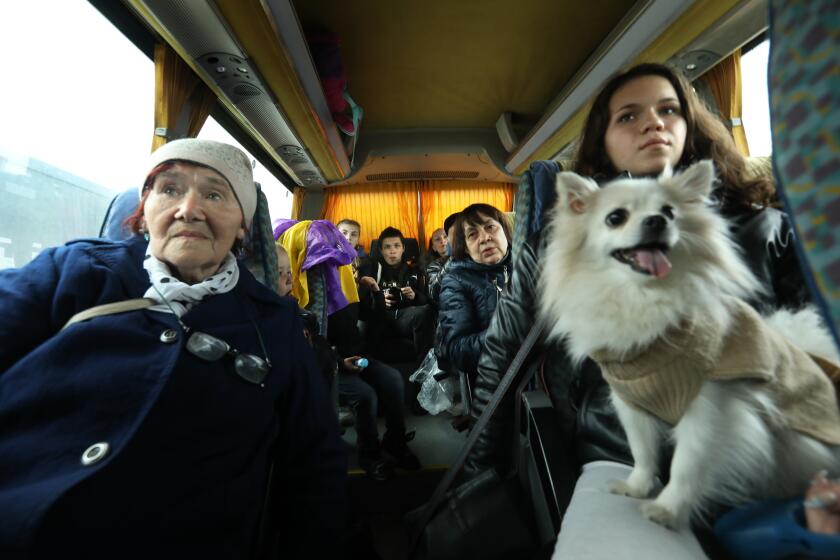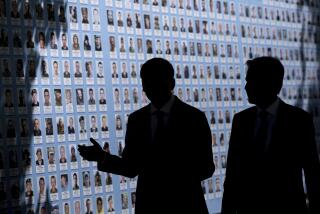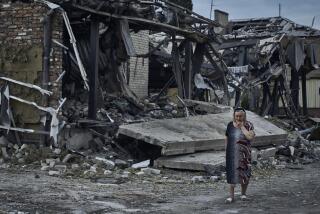Mariupol teeters as Russia readies eastern Ukraine onslaught
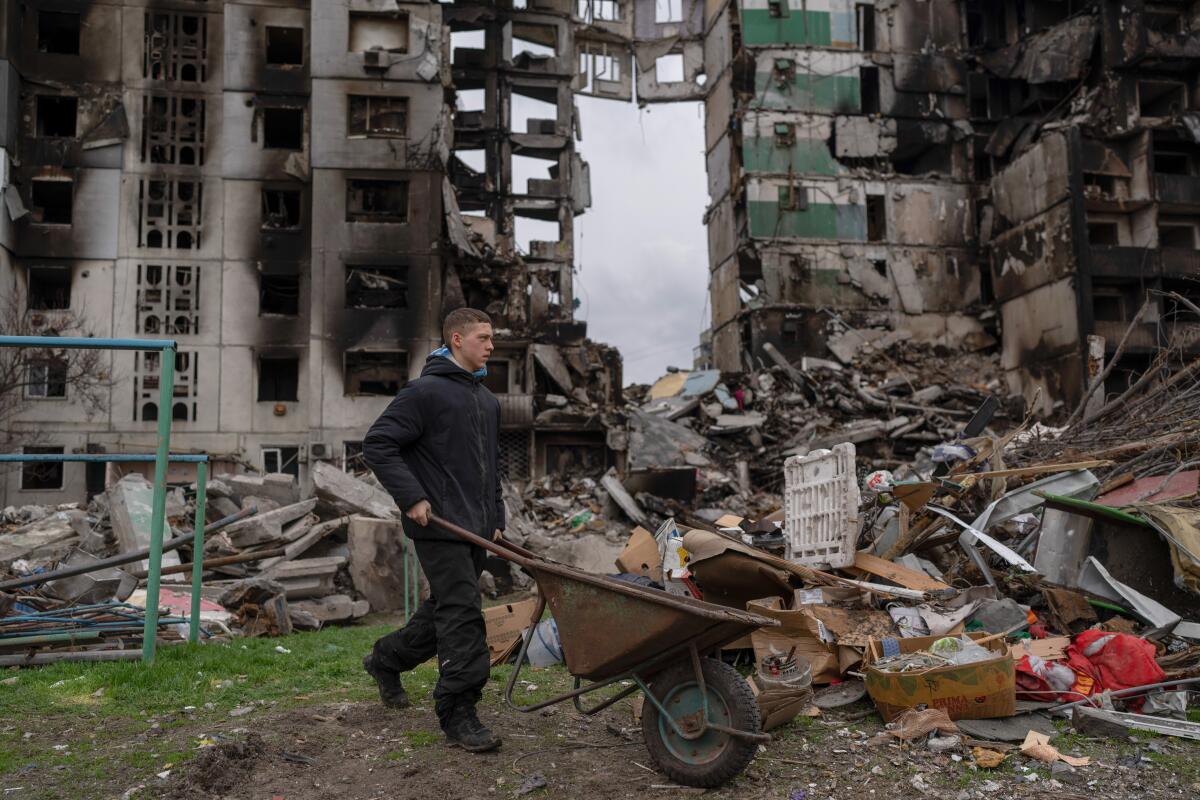
- Share via
MYKOLAIV, Ukraine — With Ukrainian President Volodymyr Zelensky telling compatriots to brace for a fateful week, Western military officials warned Monday that Russian forces would likely resort to even more brutal tactics against civilians in a looming offensive in the country’s south and east.
Nearly seven weeks into the war, Russian forces, whose campaign has been marked by strategic stumbles, appeared poised to achieve a major objective: capturing the port city of Mariupol. A Ukrainian marine brigade that described itself as among the last holdouts posted on Facebook that the unit had suffered a “mountain of wounded” and was running out of ammunition.
“For some, death, and for some, captivity,” said the post, which criticized Ukrainian military higher-ups for not providing more weaponry and resources for the fight.
Hours earlier, Zelensky said the city, the scene of one of the war’s most sustained and savage Russian offensives, had been “destroyed” and that tens of thousands of its residents were dead.
Later, Zelensky said in a virtual address to the Ukrainian people that he took seriously concerns that Russians could deploy chemical weapons in Mariupol. He urged Western leaders to impose a tougher package of sanctions, one that included an oil embargo against Russia.
“It is time,” he said, “to make this package such that even a word about weapons of mass destruction is no longer heard from the Russian side.”
Amid the carnage and rising atrocities in Ukraine, Russian President Vladimir Putin held his first face-to-face talks since the Feb. 24 invasion with a European leader, Austrian Chancellor Karl Nehammer. Nehammer was criticized in some quarters for handing the Kremlin a potential propaganda opportunity, but said afterward he had delivered a tough message to Putin that the war must end and Russian troops responsible for war crimes “would be held to account.”
In a news conference after his meeting with Putin, Nehammer said he was not optimistic. It was clear, he said, that Russian forces were preparing for a major offensive in eastern Ukraine’s Donbas region.
“The battle being threatened cannot be underestimated in its violence,” he said.
Austria is a member of the 27-nation European Union, which has imposed stringent sanctions against Russia, but is militarily neutral and not a member of NATO — a status that in the past has allowed it to maintain closer links with Moscow. Nehammer, who met over the weekend with Zelensky, has demanded a war-crimes investigation against Russia, which denies its troops have committed atrocities against civilians.
European leaders, meanwhile, signaled that more sanctions against Moscow may be in the works. But the bloc is running out of ways to try to force Putin to break off the biggest ground war in Europe in decades, which has triggered the continent’s largest refugee crisis since World War II.
More than 4.5 million Ukrainians have fled the country, according to the latest United Nations figures, and about another 7 million are internally displaced. Nearly two-thirds of all Ukrainian children have fled their homes, the United Nations Children’s Fund said Monday.
“In my 31 years as a humanitarian, I have rarely seen so much damage caused in so little time,” Manuel Fontaine, director of UNICEF’s office of emergency programs, told the U.N. Security Council.
Sanctions “are always on the table,” the European Union’s top diplomat, Josep Borrell, told reporters as he headed into a meeting Monday with the bloc’s foreign ministers in Luxembourg.
Ukraine stiffens military defenses as President Volodymyr Zelensky framed the Russian invasion as an existential threat to all of European democracy.
The United States, for its part, was stepping up diplomatic efforts to bring more countries into the anti-Russia coalition. President Biden held a virtual meeting with Indian Prime Minister Narendra Modi. India is a U.S. ally, but has not imposed any sanctions against Russia. Among a four-nation group of allies known colloquially as the Quad — the U.S., Japan, Australia and India — Biden has previously described India as the only “somewhat shaky” country regarding Ukraine.
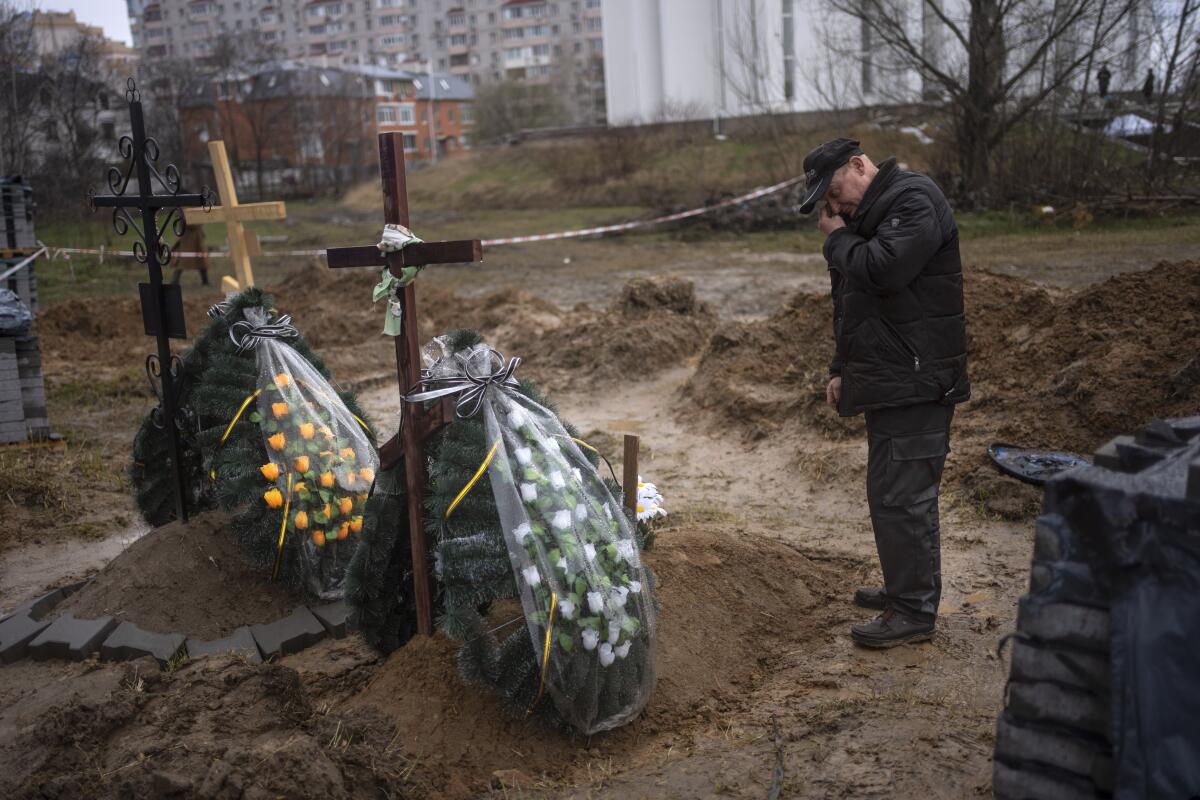
A senior Pentagon official said Monday that a long convoy of Russian military vehicles rolling toward the eastern city of Izyum with artillery, aviation and infantry support would reinforce and resupply their forces in the Donbas region. But the Russian effort to reinforce their capabilities, the official said, did not necessarily represent the beginning of a new Russian offensive in the region. Further south, the Russians were beginning to reinforce some of their positions southwest of Donetsk with artillery units.
With a new phase of the war considered all but certain, Ukrainian civilians continued to try to escape from what is expected to become the next main battleground, the country’s eastern industrial heartland and its southern seacoasts.
Even with nearly another 3,000 people fleeing those areas on Sunday, according to Ukrainian officials, the pace of the exodus has been slowed by fear of more attacks like the one on a railway station last week in the eastern city of Kramatorsk, which killed at least 57 people, including five children.
After the rocket strike on the railway station, the evacuation of the Donetsk region will be carried out from the neighboring towns of Sloviansk and Povrovsk, said Oleksandr Honcharenko, the mayor of Kramatorsk. About 160,000 residents had already fled his city, he said, and about 45,000 remain, most of whom had endured the hostilities in 2014 and would probably remain if there is no heavy shelling.
Honcharenko emphasized that any resident who wanted to get out of the city could leave.
“The experience of other cities, such as Mariupol and Chernihiv, shows that the occupants are trying to use residents as hostages for their hostilities,” he said. “Therefore, the task of the city authorities, every mayor, is to keep the number of people, especially women and children, in the cities as small as possible.”
Zelensky’s account of death and destruction in Mariupol came in a video-link speech to South Korea’s parliament — the latest in a series of virtual addresses to lawmakers around the world to drum up support and plead for more weaponry for his beleaguered country.
Since the start of the war, Moscow’s forces have sought to capture Mariupol to establish a land corridor between Russian-controlled areas of the east and the Crimean peninsula, which Russia seized eight years ago.
On Monday, the head of the separatist rebel government in Donetsk said Ukrainian forces had suffered significant defeats in Mariupol.
“The port of Mariupol, it is already under our control,” Denis Pushilin, president of the Donetsk People’s Republic, told Russian state television, according to Russian news outlets. His claim could not immediately be verified.
Mariupol’s mayor, Vadym Boychenko, said in an interview with the Associated Press that more than 10,000 civilians had died in his city and the death toll could exceed 20,000. Russian forces, he said, were attempting to conceal war crimes by bringing in mobile cremation equipment to dispose of the bodies.
“Mobile crematoriums have arrived in the form of trucks: You open it, and there is a pipe inside and these bodies are burned,” he said.
Analysts at the Washington-based Institute for the Study of War noted in a report Sunday that Russian forces had made significant territorial gains in Mariupol, bisecting the besieged city from the city center to the coast and isolating the remaining Ukrainian troops in the Azovstal steel plant in the east and the main port of Mariupol in the southwest.
A British military intelligence assessment on Monday warned that Russia might resort to the use of phosphorus weapons in its bid to finally secure control of the city, and said civilians in many areas were imperiled by the invaders’ use of indiscriminate firepower.
“Russia’s continued reliance on unguided bombs decreases their ability to discriminate when targeting and conducting strikes, while greatly increasing the risk of further civilian casualties,” the assessment said.
Claims on social media and elsewhere that chemical weapons or an unknown substance had been deployed by Russian troops could not be independently verified and were not referenced by Zelensky in his speech Monday.
John F. Kirby, a Pentagon spokesman, said the U.S. was aware of the social media reports involving potential chemical munitions in Mariupol but could not confirm them. The U.S. would “continue to monitor the situation closely,” Kirby said.
Artillery strikes rocked several eastern cities early Monday. Air-raid sirens also wailed in the southern city of Mykolaiv, near the Black Sea, where a massive blast reverberated late Sunday. The regional governor, Vitaliy Kim, said in a video posted Monday that it was a missile strike that caused no deaths.
In his overnight video address, Zelensky said Russia was trying to evade responsibility for war crimes such as the reign of terror visited on areas outside Kyiv during a monthlong occupation before abandoning the bid to swiftly seize the capital city and topple the Ukrainian government.
Investigators and Ukrainian forces have been in satellite towns outside Kyiv, recovering bodies of civilians, many killed execution-style and thrown into mass graves. Forensic specialists from France arrived Monday to help with the preservation of evidence. Ukrainian officials say the count of fatalities in those outlying areas has surpassed 1,200.
“We are doing everything we can to bring to justice every bastard who came to our land under the Russian flag and killed our people, who tortured our people, destroyed our cities, looted and tormented,” Zelensky said.
He added that the coming week will be as “tense” as any in the course of the war, as Russian forces prepare to stage “even larger operations in the east of our state.”
In laying groundwork for that offensive, Russian missiles strikes destroyed the central city of Dnipro’s airport in a missile strike Sunday, Ukrainian officials acknowledged. But Ukrainian forces have also repulsed several assaults in eastern regions, “resulting in the destruction of Russian tanks, vehicles and artillery equipment,” the British military assessment said.
Col. Oleksandr Motuzyanyk, spokesman for Ukraine’s Ministry of Defense, said at a Monday briefing that Ukrainian troops had repulsed seven Russian attacks in the Luhansk and Donetsk regions in the last 24 hours.
“The enemy is finalizing the restoring of its units and redeploying them to the territory of Luhansk and Donetsk oblasts,” Motuzyanyk said. “We predict that active combat operations will begin anytime soon. The Ukrainian army is ready for it.”
Russian forces also kept up unrelenting strikes near the seaport of Mariupol and the northeastern city of Kharkiv, Ukraine’s second-largest. Kharkiv’s regional governor, Oleh Sinegubov, wrote on Facebook that eight people, including a 13-year-old child, died in bombardment on Monday and 19 people were injured.
“These are military crimes against peaceful Ukrainians who will never forgive Russians!” Sinegubov wrote.
Fears over the fate of Ukrainian civilians were heightened with word over the weekend that Russia has appointed a military chief known for atrocities in Syria to oversee the Kremlin’s war effort. The appointment of Gen. Alexander Dvornikov, Western officials say, suggests that the deliberate targeting of civilians, a hallmark of Russia’s war strategy, is likely to continue.
Adding to the sense of menace, the notorious Chechen leader Ramzan Kadyrov, who has been leading fighters in Ukraine from his Russian republic, declared Monday that he was a loyal “foot soldier” to Putin and suggested that Ukrainian cities faced devastation if resistance to the Russian assault continues.
“Don’t let Kyiv be destroyed, Kharkiv and other cities,” Kadyrov, who has been sanctioned for human rights abuses, wrote in a Telegram post that also mentioned Mariupol, Luhansk and Donetsk.
Russia’s military setbacks since the start of the invasion have been plainly visible, but more details are emerging about the nature of its losses. The British Broadcasting Corp. reported more than 20% of the military personnel confirmed dead and identified by name were officers, including specialists like fighter pilots and veteran commanders.
Bulos reported from Mykolaiv, King from Warsaw and Jarvie from Atlanta. Times staff writers Patrick McDonnell in Kyiv contributed to this report.
More to Read
Sign up for Essential California
The most important California stories and recommendations in your inbox every morning.
You may occasionally receive promotional content from the Los Angeles Times.
